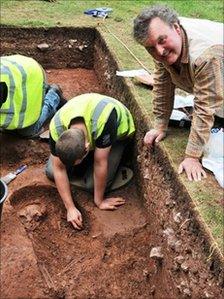Skeleton found at Edward Jenner's Berkeley house
- Published

Professor Mark Horton jointly led the excavation team at Berkeley
Archaeologists have uncovered a human skeleton at the former home of vaccination pioneer Dr Edward Jenner.
A team from the University of Bristol unearthed the remains during their annual dig in the garden of The Chantry in Berkeley, Gloucestershire.
The skeleton is believed to date from Roman or pre-Roman times and is said to be extremely rare.
Excavation leader Professor Mark Horton said it was "a completely unexpected but really important discovery".
He added: "It fills in the history between the Roman villa that we believe is on the site and the Anglo-Saxon monastery discovered during earlier digs."
Sealed remains
The skeleton is that of an adult, but the sex has not yet been determined.
It was found underneath the sealed remains of part of the Anglo-Saxon Mynster, founded in the 8th Century.
The excavation team, led by Professor Horton and Dr Stuart Prior, has been excavating part of the garden during a series of annual digs since 2007.
They have already established that Berkeley is an important Anglo-Saxon site with a mynster on the same scale and status as Gloucester.
Dr Edward Jenner lived in the house from 1785-1823 and pioneered the world-changing vaccination against smallpox there in 1796.
Visitors to the museum at Dr Jenner's House are able to visit the site and speak to the experts until Thursday.